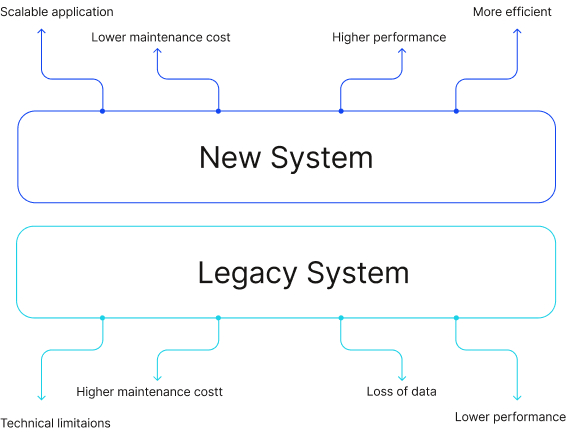How to Choose the Right Smart Manufacturing Technologies for Your Facility?
Blog
4 Min 02 Sec Read
The modern manufacturers usually get access to an array of smart manufacturing technologies – with each promising to revolutionize operations and drive efficiency. However, the real challenge for you isn’t about finding options. It’s about selecting the right solutions that can deliver measurable results within your unique environment.
In this guide, we will talk about how to achieve concrete business outcomes through the strategic application of industrial automation solutions.
Besides, our focus will also be on how working with an experienced partner like INS3 can accelerate your manufacturing digital transformation massively.
Remember, choosing the right path might seem complex, but with a clear strategy and the right support, the journey becomes far more manageable – and far more rewarding.
So, without any further ado, let’s begin.
Business Outcomes First: The Key to Success
A successful smart factory implementation doesn’t start with finding and integrating different technologies altogether. So, before considering any smart manufacturing technologies, you need to clearly define the problems that need to be solved.
Here are some questions that might be worth asking in this context –
- Which performance metric demands the most urgent improvement?
- What kind of operational challenges are eating into your profits?
- Where do persistent bottlenecks slow production down?
- What critical information could empower better decision-making?
Some practical examples of making this approach clear could be –
Instance – 1:
- Challenge – Excessive downtime of your industrial equipment
- Target – 20% reduction of this downtime and improving productivity
- Solution – Coming up and integrating predictive maintenance strategies
Instance – 2:
- Challenge – Frequent quality defects in the products you are manufacturing
- Target – 15% reduction in waste & improving the quality to manufactured items
- Solution – AI-driven analytics for real-time quality control
By aligning technology investments with well-defined objectives, organizations can maximize the ROI of smart manufacturing. This, in turn, can ensure that every innovation directly contributes to measurable, strategic improvements.
The Value of ISA-95 and Unified Namespace Architecture
Building a resilient foundation is critical for any smart factory implementation, and that begins with adopting ISA-95 Part 2 standards alongside a Unified Namespace (UNS) architecture.
ISA-95 Part 2 offers a standardized framework that focuses on –
- Establishing a common language between business and production systems
- Defining structured data models for manufacturing operations
- Lays down consistent methods for performance measurement and analysis
When paired with a UNS approach, the benefits grow exponentially and may include –
- Uninterrupted data flow across different systems that were once siloed
- Real-time operational visibility at every level of manufacturing
- Easier integration of emerging smart manufacturing technologies
- A future-ready architecture capable of scaling with your business needs
This standards-driven foundation doesn’t only focus on supporting operations in today’s world. It also positions you (the manufacturer) to maximize the ROI of smart manufacturing initiatives well into the future.
The INS3 Approach
Achieving success with smart manufacturing technologies demands more than just adopting new tools. It also requires a deep manufacturing knowledge and proven integration expertise. And this is exactly where INS3 can make all the difference – by connecting cutting-edge solutions to tangible business outcomes.
Explore how AI-driven MES and ERP integration can elevate your smart manufacturing strategy
Business-Focused Discovery
Firstly, we will focus on conducting workshops all over the organization to uncover priority pain points of your business. Once we have collected the required data, we’ll move onto the second stage – performing detailed plan walkthroughs to evaluate your existing systems. This will offer us a better understanding of the current situation of your organization.
Finally, once we have analyzed everything, we will identify some quick-win opportunities for you to deliver some early value.
Phased Implementation
In the phased implementation stage, our team will begin launching products that can offer the highest-possible impact immediately. Once that’s done, we will validate the outcomes through real-world operational data and scale successful solutions across broader operations.
Real-World Results
For instance, a food manufacturer was having a difficult time with rising material expenses and inconsistent quality while working on their products. Thanks to INS3’s expert guidance and smart factory implementation, they were able to achieve –
- A 4.3% reduction in ingredient costs
- Steady and reliable product quality across production runs
- Sharper procurement decisions backed by better data
This success wasn’t accidental. It stemmed from tightly aligning business goals with technical solutions, always led by specialists who truly understand manufacturing. It’s a clear example of how the right approach drives measurable ROI of smart manufacturing initiatives.
Explore how seamless MES and ERP integration enhances efficiency
The INS3 Difference
What truly distinguishes INS3 is a rare combination of practical manufacturing expertise and technical depth. Our strength lies not only in understanding smart manufacturing technologies but also in knowing how to make them work in real-world conditions.
Here’s what sets INS3 apart –
- Extensive Experience Across Manufacturing Environments: From food and beverage to automotive and heavy industries, INS3 has successfully navigated the unique challenges each sector presents.
- Deep Knowledge of Automation Systems: Their team understands how existing PLCs, SCADA platforms, and industrial networks operate, ensuring new technologies integrate smoothly rather than disrupt operations.
- Specialized Expertise in ISA-95 and Unified Namespace (UNS) Architecture: INS3 designs scalable, future-ready systems by leveraging proven industry standards that enable seamless data flow and system interoperability.
- Practical, Hands-On Manufacturing Knowledge: They don’t just theorize—INS3’s strategies are informed by years of hands-on experience working directly with manufacturing teams on the shop floor.
Your Path Forward with INS3
INS3’s proven process gives manufacturers a structured, strategic oath toward a successful smart factory implementation. Here’s what it includes –
- Discovery: Collaborative workshops and interviews can help in aligning all stakeholders, which ensures that business priorities, including the technology needs, drive the initiative perfectly.
- Assessment: Thorough assessment of current systems, infrastructure, and data flows can help you uncover strengths, gaps, and opportunities.
- Recommendations: INS3 provides a detailed roadmap, which includes an outline of prioritized projects, expected improvements, and a clear view of the anticipated ROI of smart manufacturing investments.
- Implementation: Execution begins with a focused, high-value project designed to demonstrate success quickly and minimize operational disruption.
- Validation: Every implementation phase is measured rigorously against pre-set targets, ensuring that the results are transparent, actionable, and aligned with business goals.
- Expansion: Once early wins are achieved, INS3 offers structured guidance to scale the solutions across multiple facilities or production lines, maximizing the value of your digital transformation.
Begin Your Journey with Confidence
In manufacturing, every technology investment must deliver measurable results, not just promises. Partnering with INS3 means more than just deploying smart manufacturing technologies – it means building a foundation that ensures sustained performance improvements.
With a business-first mindset, deep technical expertise, and a relentless focus on real outcomes, INS3 becomes not just a service provider but a trusted strategic advisor for your journey toward digital excellence.

Agile MES: The Key to Unlocking Smart Manufacturing Success
MES is a computerized system used in manufacturing operations to track and document the transformation of raw materials into finished goods. An MES system typically manages and monitors work orders, equipment, materials, and personnel on the shop floor. The system provides real-time visibility into production processes, helps optimize manufacturing operations, and improves the overall efficiency of the manufacturing process.

Understanding OEE: The Key to Manufacturing Efficiency
In today’s competitive manufacturing landscape, improving efficiency and productivity is crucial for businesses to remain competitive. One of the key metrics used to measure manufacturing efficiency is OEE or Overall Equipment Effectiveness. In this blog, we will take a closer look at OEE and its importance in manufacturing.

How to Effectively Conduct a Legacy System Integration
Legacy system integration can be a daunting task, but it’s a necessary one for many manufacturers that rely on outdated systems to run their business. Integrating legacy systems with modern technology can improve efficiency, streamline processes, and save time and money. However, it’s important to approach the integration process carefully and methodically to ensure success.
Share on :
Keep On Reading
Subscribe to Our Newsletter
Subscribe to our weekly newsletters to get updates regarding our new production, behind the scene process of our art creation and much more.
After submitting this form you will receive an e-mail with a confirmation link that you must click to complete your request. Detailed information on processing and cancellation can be found in our privacy policy.

